As an Amazon Associate I earn from qualifying purchases.
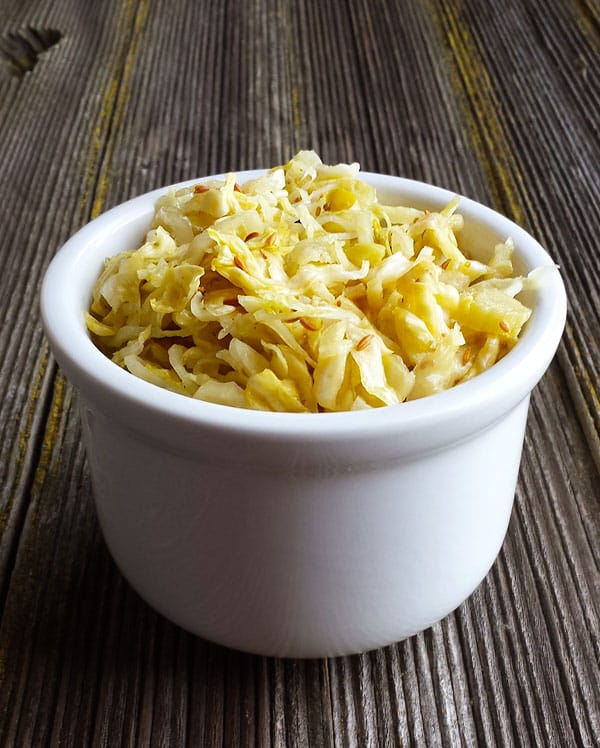
When life gives you fennel, you make fennel sauerkraut. Or at least I do. Here in NorCal, fennel is a perennial vegetable, giving you lovely, fat bulbs year after year after year. I had one patch that gave me bulbs for 8 years before I finally dug it up.
All you do is slice the bulbs off at the base. I typically get two cuttings a year: One in late summer, the next in early spring.
Well, this spring was a bumper crop. I cut maybe 25 gigantic fennel bulbs, completely inundating my kitchen with anise-y goodness… and earwigs, which view the gaps in each fennel bulb the way you would an aromatic apartment complex.
Cleaned and trimmed (I save the fronds and stalks for making broth and stock), I still had a ton of fennel. What to do?
Kraut. I honestly had never heard of fennel sauerkraut before, but the idea just came to me. I looked it up on the InterWebz and quickly discovered that fennel kraut is a thing. So I look at a bunch of recipes and finally decided to just use my own standard kraut recipe, subbing in 50 percent shaved fennel for the shredded cabbage.
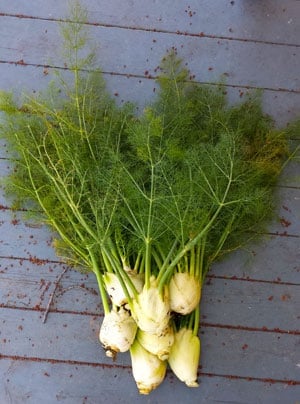
My kraut is more or less standard, but I add a healthy dose of seeds to it, almost all from the Apiaceae family, which happens to include fennel.
This is a Truth: Vegetables in the same botanical family tend to work well together in the kitchen, like carrots and parsley, onions and garlic, tomatoes and peppers. My kraut seed mix is caraway, celery seeds, fennel seed, wild carrot seed and one outside the Apiaceae clan: juniper berries. If you don’t happen to have any wild carrot seed lying around, which 99 percent of you won’t, just skip it.
I like to ferment my kraut for three weeks, which is a nice balance of sour and salty, and the vegetables stay really crunchy. You can ferment less time or longer if you’d like. And remember, the kraut will continue to be alive in the fridge, changing and mellowing as time progresses.
Serve this kraut wherever you would any other kraut, although this version tastes a little brighter a lighter than most other kraut recipes. Try it with your favorite sausage, or as a bed for Northern Italian canederli dumplings (knödel), which are basically the same thing as Bavarian dumplings, only a bit lighter. There’s also a great recipe for sauerkraut fritters in Chef Jeremy Nolen’s book New German Cooking: Recipes for Classics Revisited.
I have a few other really nice fennel recipes, such as pickled fennel, salmon patties with a fennel-watercress salad, and chicken or pheasant salad with fennel.
Fennel Sauerkraut
Ingredients
- 2 1/2 pounds fennel bulbs, sliced thin
- 2 1/2 pounds shredded cabbage
- 1.6 ounces kosher salt (45 grams)
- 1 tablespoon crushed juniper berries
- 1 tablespoon caraway seeds
- 1 teaspoon celery seed
- 2 teaspoons fennel seeds
- 2 teaspoons wild carrot seeds (optional)
Instructions
- Mix the shredded fennel and cabbage well in a very large bowl. Put down a layer of the vegetables about an inch thick in a 3-gallon crock. Sprinkle with salt and some of the seeds. Repeat until you have everything in the crock. If you can, mix it one more time. Place a plate or somesuch on the kraut and weigh it down with a large jar of water. Put the crock in a cool, dark place.
- The next day, check to see if the vegetables have given up enough brine to completely cover themselves. If not, make some brine and add it. You want the brine to be 2 percent by weight, so 19 grams (or 0.7 ounces) of salt per quart of water. Let the sauerkraut ferment at between 60°F and 73°F for at least a week, and up to a month.
- To finish, remove the weight and plate and move the finished kraut to quart-sized canning jars. If there is not enough brine to completely submerge the fennel kraut in the jars, make more brine as you did in Step 2. Cover the jar with their lids and store in the refrigerator for basically ever. I've had batches of sauerkraut last 2 years in the fridge.
Nutrition
Nutrition information is automatically calculated, so should only be used as an approximation.
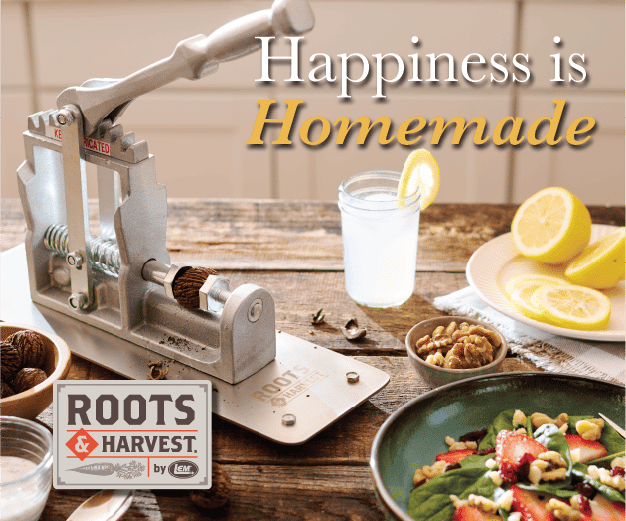
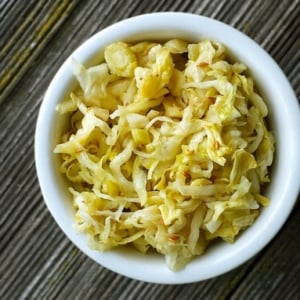
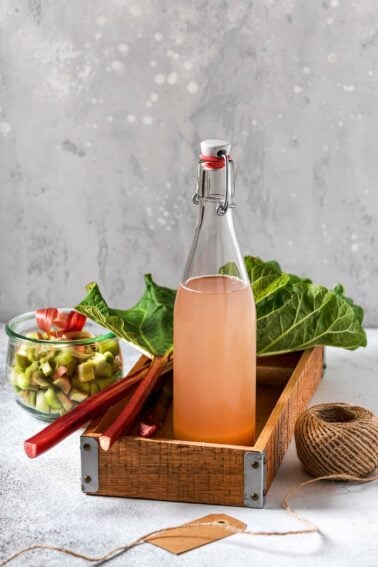
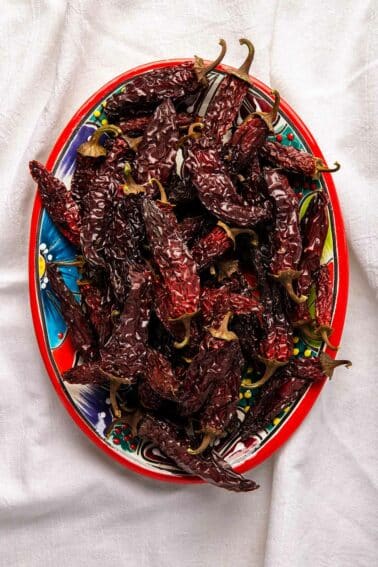
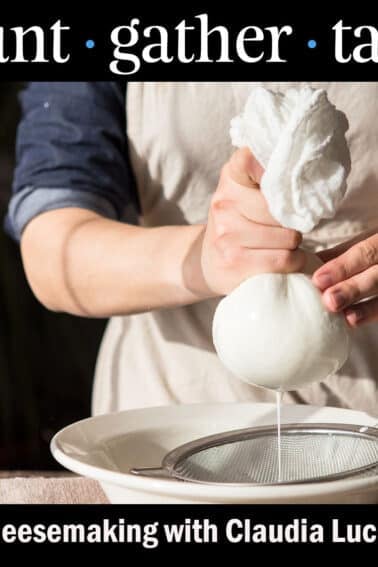

This has become a family favorite, thank you so much! We aren’t grown up enough to like juniper berries much but we crushed three in it and it was good! Used ajwain for wild carrot seed and otherwise followed your recipe to the letter. It’s amazing!
I made a large batch the fall of 2021. It was great! I’m 3 weeks into fermenting my second batch. It tastes good, but I’m letting it go another week before I jar and refrigerate it.
Found your recipe looking for what to do with fennel we received in our weekly ugly fruit and vegetable box – fermenting now in Copenhagen. Cheers.
Thank you for this recipe. I successfully make all sorts of “krauts” in heavy zip lock freezer bags. They are easy to burp, require much less work and equipment. When the “kraut” is to my taste, I refrigerate in glass jars.
Love that you’re in NorCal too! The Bay area is great for finding these ingredients a-plenty, especially organic. Love making kraut, although i’ve never tried it with fennel! Thanks for sharing. I’ll have to report back once i’ve made it!
This looks and sounds great! I love sauerkraut, although I’ve never had the best luck when I’ve made it. I may have to try your recipe though!
I assume you’re using fresh, not dried juniper?
Aaron: Dried.
Okay, I’m going for it- shit-ton of fennel, check. Wild Montana juniper berries, check. I’m with the 99% in having no wild carrot seed but I’m sure it’s gonne be great. Thanks for the inspiration.
That sounds really good its funny how you can think of something these days and then find out its been done before, I think its still an original thought but you can confirm it has a chance of working before putting time into it. I am sure you would have followed through on this even if you hadn’t found out it had been done already. Preservation kitchen has a fennel bulb pickle recipe that is my favorite pickle if you still have more fennel to use up? Its perfect pickle for a charcuterie plate.
Greg: I know, right? I love Paul’s book (he’s a friend) and I do have some more fennel. Will check that recipe out.
awesome. I had this same thought last spring. I’m glad you did the experimenting for me!
Clever take on an ancient staple.
Nice!